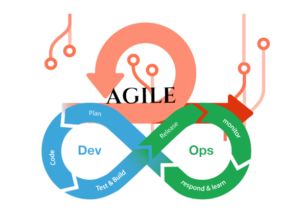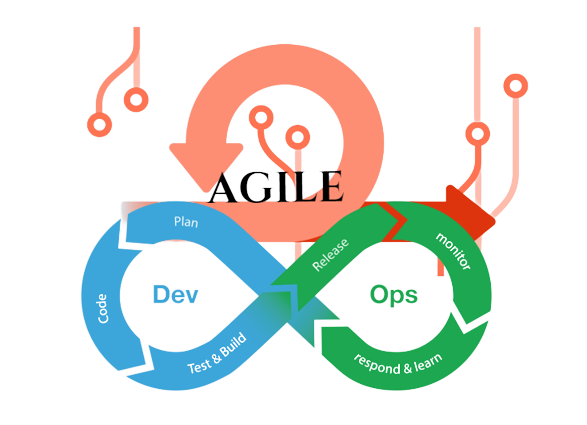The software development industry has changed dramatically in recent years, and the Agile methodology has become the dominant approach for delivering high-quality software quickly and efficiently. However, to take full advantage of Agile methodologies, it’s important to implement a DevOps approach to software development.
The software development industry has changed dramatically in recent years, and the Agile methodology has become the dominant approach for delivering high-quality software quickly and efficiently. However, to take full advantage of Agile methodologies, it’s important to implement a DevOps approach to software development. DevOps is a set of practices that combines development and operations to improve the speed and quality of software delivery.
What is DevOps?
DevOps is a cultural and technical movement that aims to bridge the gap between development and operations teams. By collaborating and sharing responsibilities, DevOps enables teams to work together more effectively and deliver better software, faster. DevOps is also a response to the fast pace of technology, as businesses are expected to be able to quickly adapt to changing market demands. In this article, we will explore the importance of DevOps for Agile software development.

Why DevOps Matters for Agile Development
-
Faster Time-to-Market
It practices enable teams to automate processes and work more efficiently, which helps to speed up the development process and get products to market faster.
-
Improved Collaboration
It promotes collaboration and communication between development and operations teams, which helps to reduce friction and increase productivity.
-
Increased Quality
DevOps practices, such as continuous integration and continuous delivery, help to catch and resolve issues early in the development process, which improves the overall quality of the product.
-
Better Customer Experience
By delivering high-quality products faster, DevOps helps to improve the customer experience and increase customer satisfaction.
-
Enhanced Agility
DevOps enables teams to respond quickly to changing business requirements, which enhances their overall agility and competitiveness.
How DevOps Supports Agile Development
-
Continuous Integration and Continuous Delivery (CI/CD)
CI/CD is a key DevOps practice that enables teams to automate the software development process and deliver products faster.
-
Automated Testing
DevOps practices, such as automated testing, help to catch and resolve issues early in the development process, which improves the overall quality of the product.
-
Infrastructure as Code (IaC)
IaC is a DevOps practice that enables teams to manage their infrastructure as code, making it easier to automate and scale their systems.
-
Monitoring and Feedback
DevOps practices, such as continuous monitoring and feedback, help teams to identify and resolve issues in real time, which improves the overall quality of the product.
-
Agile Planning and Execution
DevOps practices, such as Agile planning and execution, help teams to quickly respond to changing business requirements and deliver high-quality products faster.
The Benefits of DevOps for Agile Software Development
The implementation of a DevOps approach has numerous benefits for Agile software development. Firstly, it improves collaboration and communication between development and operations teams, reducing the risk of misunderstandings and delays. Secondly, DevOps enables teams to quickly identify and resolve problems, leading to faster issue resolution and increased customer satisfaction. Finally, DevOps allows teams to automate repetitive tasks and reduce manual errors, leading to increased efficiency and faster time-to-market.
The Importance of Continuous Integration and Continuous Deployment (CI/CD)
One of the key components of DevOps is Continuous Integration and Continuous Deployment (CI/CD). CI/CD is the process of continuously integrating code changes into a single repository and automatically deploying code changes to a production environment. This approach enables teams to quickly deliver software changes and reduces the risk of introducing bugs or errors.
The Role of Automation
Automation is a crucial aspect of DevOps and enables teams to improve the speed and quality of software delivery. It can be used for tasks such as testing, deployment, and infrastructure management, freeing up time for developers to focus on more critical tasks. It also helps to reduce the risk of human error, leading to increased reliability and stability.
The Importance of Monitoring and Metrics
Monitoring and metrics are essential for DevOps, as they provide teams with valuable insights into the performance and behavior of their systems. By monitoring and analyzing metrics, teams can quickly identify potential issues and take corrective action. This helps to ensure that systems are performing optimally and helps to prevent downtime and performance issues.
Conclusion
DevOps is a critical enabler of Agile software development, helping teams to deliver high-quality products faster and respond quickly to changing business requirements. By promoting collaboration and communication, automating processes, and enhancing quality, DevOps enables organizations to stay ahead of the competition and succeed in today’s fast-paced business environment.
Whether you are a small startup or a large enterprise, investing in DevOps is a wise decision. Contact Tanbits to learn more about our DevOps services. Our company can help you achieve your goals and grow your business.
BACK










